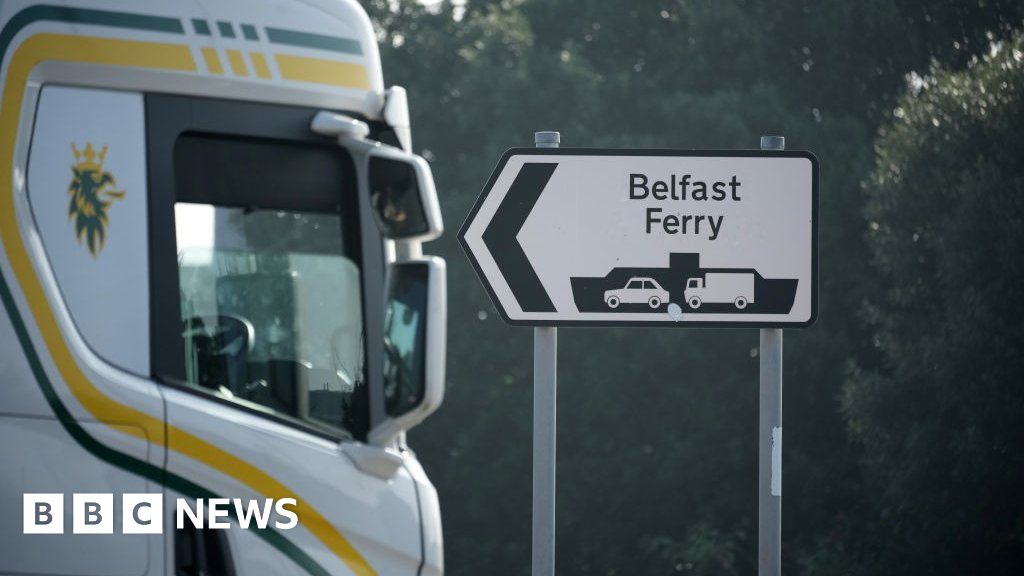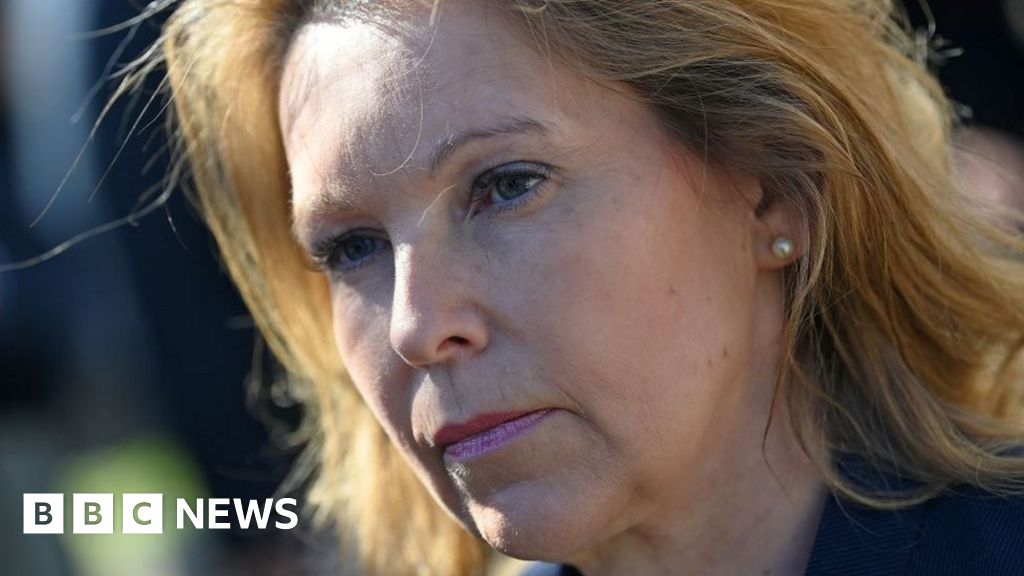- By John Campbell
- BBC News NI economics and business editor
Sir Jeffrey Donaldson would like to see the end of the Irish Sea border
It is still unclear whether the Democratic Unionist Party (DUP) is prepared to accept a deal from the government and return to Stormont.
But the contours of a possible deal are starting to emerge.
The DUP has been boycotting devolved government in protest at Northern Ireland’s Brexit deal, now called the Windsor Framework
The party wants to see the end of the “Irish Sea border” – the post-Brexit trade frictions between GB and NI.
That is not going to happen but the government is offering measures to tackle its effects.
Dealing with divergence
The Irish Sea border is not in a final, fixed state.
It exists because Northern Ireland has remained inside the EU’s single market for goods while the rest of the UK has left.
That means there is free-flowing trade between Northern Ireland and the Republic of Ireland.
However, new checks and controls are required on some goods coming from Great Britain.
At the point when Great Britain left the single market it had the same rules as the EU, but over time divergence will occur as the two sides update their rules.
Growing divergence could potentially increase the impact of the sea border with new controls on goods coming from GB or a requirement for businesses to make changes to their processes.
The Daily Telegraph has reported that the government is offering to introduce a new requirement that all new UK laws are “screened” to ensure they will not increase the impact of the sea border.
The newspaper said it would mean all legislation would have to accompanied by a ministerial statement confirming it did not have a “significant adverse impact” on internal UK trade.
Effectively, the government would choose to limit active divergence from the EU.
What is less clear is if the government will actively align with the EU when it updates its rules.
This idea has a Brexit pedigree.
It promised there would be “no divergence in the rules applied in Great Britain and Northern Ireland in areas covered by the protocol”.
In other words the whole of the UK would continue to align with whatever EU rules applied in Northern Ireland to “ensure everything possible had been done to avoid any additional preventable barriers within the UK internal market”.
It’s not yet clear if the new offer will go as far as this.
Northern Ireland to GB trade
One of the few promises Boris Johnson made to unionists that he actually kept was that there would be no new paperwork for goods going from Northern Ireland to GB.
In November 2019 he told a businessman “if somebody asks you to [fill in a form], tell them to ring up the prime minister, and I will direct them to throw that form in the bin”.
The government has on several occasions promised to legislate to strengthen this “unfettered access” for Northern Ireland goods.
The most recent occasion was in December in what looked like a choreographed House of Commons exchange between the prime inister and DUP leader Sir Jeffrey Donaldson.
Sir Jeffrey asked: “Will the prime minister bring forward legislation to amend the UK Internal Market Act and both guarantee and futureproof Northern Ireland’s unfettered access to the UK’s internal market in all scenarios?”
Rishi Sunak’s reply was: “I recognise the need to do more in this area and I can confirm to him that the Government does stand ready to legislate to protect Northern Ireland’s integral place in the United Kingdom and the UK internal market, alongside an agreement to restore the executive.”
However it also contains clauses which should ease the paperwork required for Northern Ireland goods which are being sent to GB via Republic of Ireland ports.
Expect these measures to receive a higher profile in the context of a deal.
What about the green lane?
One of the key features of the Windsor Framework is a green lane/red lane system for goods arriving from GB.
The basic idea is that goods which are moving through Northern Ireland into the Republic of Ireland and the wider EU have to use red lane procedures.
That means full customs documentation and checks at the ports for some products.
Goods which are coming from GB to be sold to consumers in Northern Ireland will use the green lane, meaning minimal paperwork and few routine checks.
However the DUP wants the green lane to be simplified.
In November, Sir Jeffrey wrote to party members describing the current arrangements as “neither acceptable or practical”.
The difficulty with seeking changes in this area is that the arrangements were jointly agreed by the EU and UK and neither side has an appetite for reopening negotiations.
That means that any easements would have to be found within the bounds of the Windsor Framework.
For example 10% of food consignments going through the green lane are currently subject to an “identity check” which is due to be reduced to 5% by July 2025 – could that be sped up or further phased down?
The Daily Telegraph has suggests that there will at least be a cosmetic change with the green lane being renamed the ‘UK Internal Market Lane.’
Strengthening the union
The government cannot give the DUP a definitive guarantee on Northern Ireland’s place in the UK.
That is because the Good Friday Agreement makes clear that Northern Ireland’s membership of the union is conditional.
If a majority of people in Northern Ireland and the Republic of Ireland want a united Ireland then the British and Irish governments are under “a binding obligation” to implement that choice.
But it is understood that any deal will contain new pro-union structures modelled on some of the all-Ireland bodies which flowed from the Good Friday Agreement.
A new political “East-West Council” has been discussed and it’s understood a new business body similar to Intertrade Ireland is another possibility.
Intertrade Ireland is jointly funded by Stormont and the Irish government to help small businesses develop cross-border markets.
The new body would be aimed at promoting trade between NI and the rest of the UK.

William Turner is a seasoned U.K. correspondent with a deep understanding of domestic affairs. With a passion for British politics and culture, he provides insightful analysis and comprehensive coverage of events within the United Kingdom.








